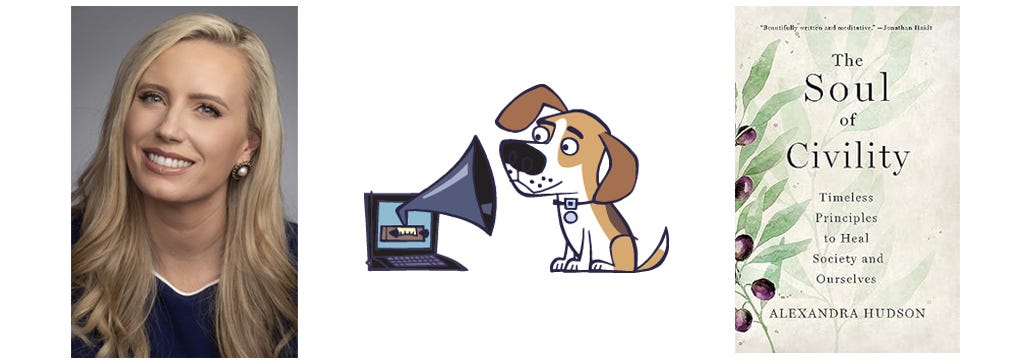Alexandra is a journalist and public speaker. She’s the founder of Civic Renaissance, a newsletter and intellectual community dedicated to moral and cultural renewal. She’s also an adjunct professor at the Indiana University Lilly School of Philanthropy. Her first book is The Soul of Civility: Timeless Principles to Heal Society and Ourselves.
You can listen right away in the audio player above (or on the right side of the player, click “Listen On” to add the Dishcast feed to your favorite podcast app). For two clips of our convo — on the moments when being civil is impolite, and the importance of indifference to others’ opinions — pop over to our YouTube page.
Other topics: being raised in horse country in Canada; having “Judi the Manners Lady” as a mother; moving to DC in the fall of 2016 and hating it; working for Trump in the Department of Ed; the rude awakening of being loathed by her peers as an appointee; the difference between politeness and civility; a story of Queen Victoria’s bad manners; how personal boundaries are often crucial for civility; Arnold Bennett’s book How to Live 24 Hours a Day; the virtue of curiosity toward those who seem boring; hypocrisy vs. inauthenticity; Tom Holland’s Dominion; when the love of others and the self are in tension; online anonymity; the ever-growing need for forgiveness and gratitude; Aristotle and “the magnanimous soul”; the Stoics; Isocrates as the Miss Manners of ancient Greece; Erasmus; the “respectability politics” of the Civil Rights Movement vs. the crudeness of pro-Gaza protesters and the January 6 mob; empathy toward road-ragers; defenders of Gay retaliating with plagiarism charges of their own; Slow Horses and the crude authenticity of Oldman’s character; the cult of authenticity in Gen Z; how civility and toxicity are contagious; zealous extroversion; why Alexandra wants to kill the phrase “let’s get lunch”; me pressing her on how anyone praising civility could work for Trump; and why auto-didactism is the subject of her next book.
Browse the Dishcast archive for an episode you might enjoy (the first 102 are free in their entirety — subscribe to get everything else). Coming up: Jonathan Freedland on the war in Gaza, Jennifer Burns on her new biography of Milton Friedman, and Abigail Shrier on why the cult of therapy harms children. Please send any guest recs, dissents, and other pod comments to dish@andrewsullivan.com.
Last week’s episode with Carole Hooven was a huge hit. The following clip went viral on YouTube with 29,000 views and counting:
From a fan of the episode:
Thank you for the remarkable conversation with Carole Hooven. I have been well aware of the rot in academia, but I had no idea of the extent DEI had infiltrated all the various departments like small Stasi cells spying on everyone. I was sorry to hear what you and Carole had to endure with no support from colleagues, but I was not surprised.
I recall an amusing anecdote about Bart Giamatti, a classics professor and former Yale president who later became baseball commissioner. When asked about the biggest difference he found between the two jobs, he said in baseball you meet a better class of people. Sports and the military are the last bastions of meritocracy — but they, too, are under siege.
Another writes:
I was a grad student at Harvard during the late '60s and early '70s. This kind of behavior on the faculty would have been unimaginable back then. I no longer recognize the university where I spent so much valuable time.
Me neither. And I was there in the 1980s. Another listener is catching up on Carole’s work:
I read Professor Hooven’s book on testosterone just a few weeks ago, long after she joined the Dishcast to discuss it. I was so impressed by the book, I gave it to one of my sisters. I noticed how the first half-dozen or so pages were dedicated to respectfully laying the groundwork for ignoring politicized critiques of biology, before getting down to biology.
A few days ago, I read that Hooven had lost her job at Harvard. Clearly Claudine Gay, the Harvard Corporation president Pritzker, and the other apparatchiki remain well-entrenched. Gay is still a professor with a $900K salary, despite her plagiarism. Meanwhile, a true scholar such as Carole Hooven is out of a teaching job.
Another notes:
I want to call your attention to the comments section of the NYT op-ed “The Claudine Gay Debacle Was Never About Merit.” Check out the reader picks; they all reject the essay’s premises. I have never seen such a degree of rejection of a woke piece in the Times, and the editors closed the comments section the day it was published. Unwelcome thoughts from the subscriber base. Dare we hope the Gay “debacle” is a turning point, and that even the committed left is beginning to see the light?
I think it might be. A Harvard alum “almost wept in relief and despair listening to your conversation with Carole”:
At the risk of parroting the ways of the standpoint epistemology set: I’m a “cis,” gay, middle-aged white male. I’m an Episcopal priest and an active-duty US Navy chaplain currently serving with a Marine battalion. I was a first-generation college student (Yale) and grew up dirt poor in a single-parent household.
I arrived at Harvard Divinity School thinking I was fairly left of center (I once worked for Howard Dean), but I left HDS with an insatiable appetite for Philip Rieff and an overwhelming conviction that elite higher education in its current form is a metastasis on society. Your talk with Carole presented that case more clearly and persuasively than I ever could. This monstrously post-moral, post-everything, proto-Klingon ideology at Harvard has gotten a stranglehold on everything from FAS to the medical school. It really is that bad.
You are completely correct that DEI must be utterly rooted out if anything is going to improve. Claudine Gay (and Aiden Maese-Czeropski, for that matter) have probably done more to ensure Trump’s election than Chris Rufo ever could.
This next listener got creative:
I enjoy a good turn of phrase, and your use of “astonishingly mid” to describe Gay’s academic portfolio was the highlight of my day. Even my teen daughter found it humorous, which is an achievement in and of itself. So she and I created a shirt in your honor on our t-shirt page:
From a listener in Hong Kong:
I am almost a subscriber (a few more great pod conversations that fade out and I’m there.) Listening to Carole and her experience at Harvard, I immediately thought, this is the Chinese Communist Party in action. The DEI subcommittee she ran foul of is exactly the parallel power structure you find in the businesses and organisations of mainland China. It is never clear who has authority, but when push comes to shove, the parallel structure wins. The DEI/CCP does not follow rules, but always claims necessity for the higher goal.
The DEI/CCP personnel are either true believers or highly ambitious. Carole seems to have been a victim of someone who combined both. In her reaction, Carole portrayed a typical “bourgeois” disbelief: that an appeal to common sense, the facts, and reason would persuade her tormentors of their error. ‘Twas ever thus that in every revolution, the revolutionaries — often young — sweep aside the incredulous in pursuit of enemies. The Caroles are just collateral damage along the way to a more “perfect” world.
And another:
I have three post-graduate degrees from institutions that all skewed left. If you weren’t a lefty, you knew you were an outsider, but it was OK. But wow, things have changed.
People like me would always but affectionately make fun of people like Carole — bourgeois liberals who didn’t know anyone who was right-wing, libertarian, traditional or religious. I tended to get along swimmingly with overt Communists. In grad school I knew someone who ran for office on the CPUSA ticket and met many a Trotskyite. I could talk to these people because I had a grounding in Marxism and a shared disdain for the existing order. But let me be clear: the wokeists are not Marxists. They take the silliest aspects of Nietzsche, mix in Paul Feyerbend, Frantz Fanon and Foucault, apply Gramscian method and voila: wokeism.
Thank God I didn’t become an academic. I have a sarcastic, wise-ass sense of humor, and the devil hates laughter.
The main reason I didn’t go into academia was the office politics. But boy am I glad I stayed away.
A dissenter is sick of hearing about Harvard:
Do you not realize the irony of the Ivy-educated pundit class whining about how out of touch Harvard elites are? Dude, the actual working class doesn’t care about Harvard. Never did before, and still doesn’t now. The amount of column inches wasted on elites trying to stick it to other elites is what is truly depressing about the modern media landscape. I understand that it makes sense to write what you know, but at least be honest about it. This whole topic is the pinnacle of elitist wank.
Busted, I suppose. But elites affect the masses. And the ideology brewed in the academy has spread far and wide.
A depressing tale about DEI:
Glad you’re feeling better. Brilliant conversation with Carole. It reminded me of some horrific things I witnessed first-hand working at a large national health insurance company.
Listen to this episode with a 7-day free trial
Subscribe to The Weekly Dish to listen to this post and get 7 days of free access to the full post archives.













